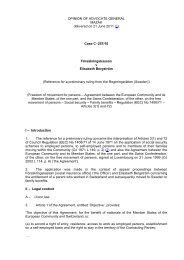Study on non-legislative initiatives for companies to promote gender ...
Study on non-legislative initiatives for companies to promote gender ...
Study on non-legislative initiatives for companies to promote gender ...
Create successful ePaper yourself
Turn your PDF publications into a flip-book with our unique Google optimized e-Paper software.
Gender equality <strong>initiatives</strong> 129<br />
the priorities in society. Based <strong>on</strong> these indica<strong>to</strong>rs, most of the analysed <strong>initiatives</strong><br />
could be judged as being successful, as they generally report increasing participati<strong>on</strong><br />
rates and growing interest in the media.<br />
An initiative can also be regarded successful if other countries adapt the c<strong>on</strong>cept<br />
and implement a similar measure (see e.g. ““Audit berufundfamilie” (work and family<br />
audit)) or if main elements of the initiative are transferred in<strong>to</strong> law because they have<br />
been evaluated as crucial <strong>for</strong> the support of <strong>gender</strong> equality (see “Entidad<br />
Colaboradora en Igualdad de Oportunidades entre Mujeres y Hombres” (entity<br />
collaborating <strong>on</strong> equality of opportunities am<strong>on</strong>gst women and men), as part of the<br />
Optima programme in Spain). This example shows also the limitati<strong>on</strong> of n<strong>on</strong>-<strong>legislative</strong><br />
<strong>initiatives</strong> though. Thus, some countries decide <strong>to</strong> not rely exclusively <strong>on</strong> the voluntary<br />
commitment and participati<strong>on</strong> of enterprises.<br />
Bey<strong>on</strong>d dispute, n<strong>on</strong>-<strong>legislative</strong> <strong>initiatives</strong> promoting <strong>gender</strong> equality at the workplace<br />
c<strong>on</strong>tribute <strong>to</strong> the awareness of <strong>gender</strong> issues in the labour market. They unfold crucial<br />
fields where <strong>gender</strong> inequalities persist and offer soluti<strong>on</strong>s how <strong>companies</strong> can change<br />
their organisati<strong>on</strong>al structures <strong>to</strong> foster <strong>gender</strong> equality. Besides, addressing <strong>gender</strong><br />
inequalities in the labour market and appealing <strong>to</strong> the resp<strong>on</strong>sibility of <strong>companies</strong> in this<br />
c<strong>on</strong>text can have positive side effects <strong>to</strong> other issues related <strong>to</strong> CSR or diversity as it<br />
shows that equal treatment can have positive effects <strong>for</strong> the enterprise itself (see 4.3).<br />
4.2.1 Success fac<strong>to</strong>rs<br />
Despite the difficulties in assessing the <strong>initiatives</strong> with a view <strong>to</strong> the achievement of<br />
their overall societal objective, some success fac<strong>to</strong>rs could be identified which seem <strong>to</strong><br />
c<strong>on</strong>tribute <strong>to</strong> the acceptance of these <strong>initiatives</strong> in the <strong>companies</strong> and there<strong>for</strong>e<br />
indirectly foster the achievement of more <strong>gender</strong> equality. These principles can be<br />
found in many <strong>initiatives</strong> and can be classified as good practice.<br />
• Flexible and tailored approach: A basic principle is that the broader an<br />
initiative is designed the more flexible the approach should be in terms of<br />
creating sub-categories of different target groups. The requirements have <strong>to</strong> be<br />
adapted <strong>to</strong> the situati<strong>on</strong> of the <strong>companies</strong> as the measures implemented in<br />
SMEs will differ from those in large <strong>companies</strong>. Private enterprises face other<br />
challenges than public organisati<strong>on</strong>s. There<strong>for</strong>e, e.g. most of the prizes know<br />
different awards taking in<strong>to</strong> account the framework c<strong>on</strong>diti<strong>on</strong>s of their target<br />
groups and <strong>to</strong> not discourage the participati<strong>on</strong> of <strong>companies</strong> which are<br />
motivated <strong>to</strong> participate but do not have sophisticated <strong>gender</strong> equality plans yet.<br />
• Adaptati<strong>on</strong> of the initiative: Flexibility of the initiative should not <strong>on</strong>ly be given<br />
with a view <strong>to</strong> the target group but also in relati<strong>on</strong> <strong>to</strong> developments <strong>on</strong> the labour<br />
market and social change. In many countries it can be observed that the focus<br />
of the <strong>initiatives</strong> has shifted from rec<strong>on</strong>ciliati<strong>on</strong> issues <strong>to</strong> e.g. issues c<strong>on</strong>cerning<br />
the vertical segregati<strong>on</strong> <strong>on</strong> the labour market. Such adaptati<strong>on</strong>s reflect the<br />
discussi<strong>on</strong> in society, i.e. that <strong>gender</strong> equality is not <strong>on</strong>ly about family friendliness<br />
but c<strong>on</strong>cerns many domains. A possibility of keeping the <strong>initiatives</strong><br />
flexible is the setting of yearly changing themes <strong>to</strong> react <strong>on</strong> recent developments<br />
and actual trends. In additi<strong>on</strong>, this can foster the c<strong>on</strong>tinuous ef<strong>for</strong>ts of<br />
<strong>companies</strong> <strong>to</strong> become active in various fields.
















